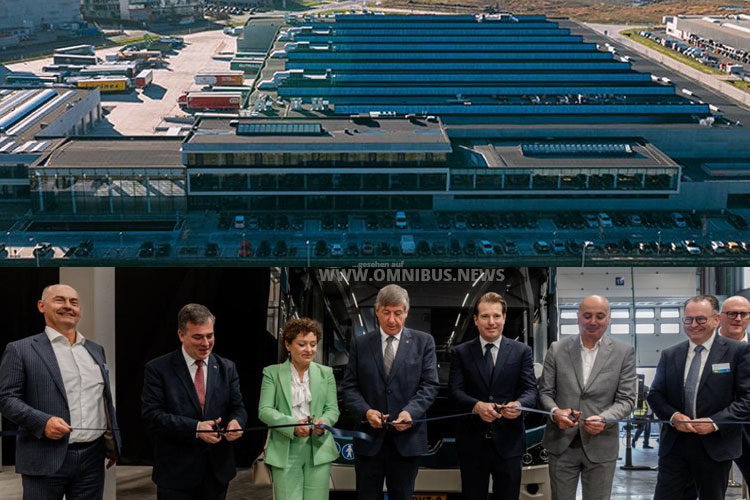
VDL hat im belgischen Roeselare eine E-Bus-Fabrik in Anwesenheit des flämischen Ministerpräsidenten Jan Jambon (Bildmitte, links neben Willem van der Leegte) und der flämischen Ministerin für Mobilität, Lydia Peeters (grünes Kostüm), eröffnet. Foto: VDL; Montage: omnibus.news
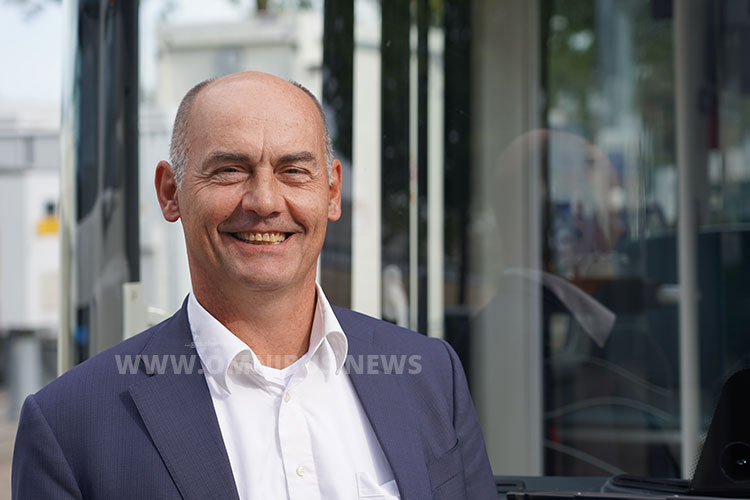
Um die Busindustrie in Europa zu halten, ist es wichtig, mit Initiativen aus anderen Kontinenten gleichzuziehen. „Es muss ein faires Spiel sein, ein Spiel mit den gleichen Spielregeln“, sagte Rolf-Jan Zweep, CEO von VDL Bus & Coach, anlässlich der Werkseröffnung. Foto: Schreiber
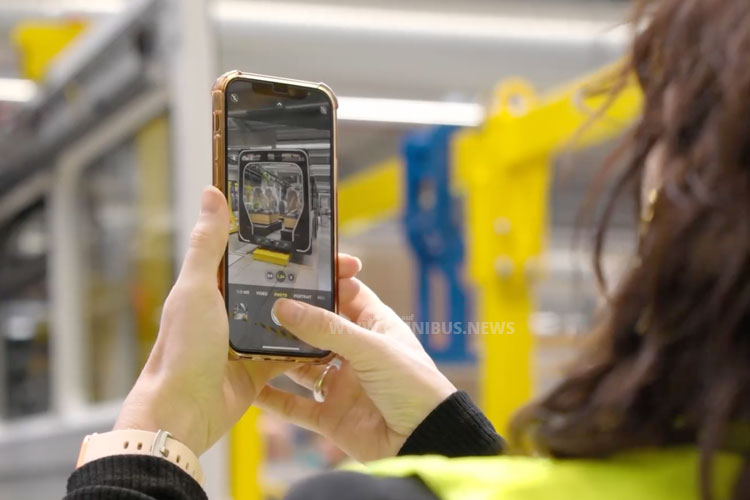
VDL Bus & Coach hat eine E-Bus-Fabrik in Belgien eröffnet und gewährt erste Einblicke. Foto: VDL
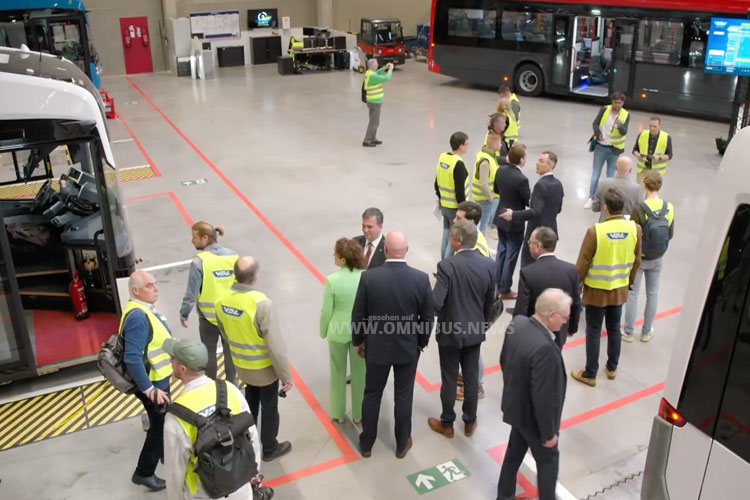
Ein geführter Rundgang zeigte die Produktion der Elektrobusse der Citea-Baureihe. Foto: VDL
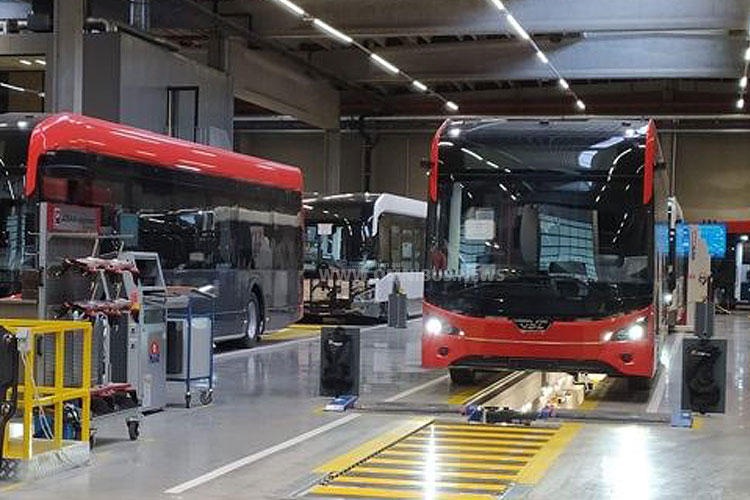
Die neue Leichtbau-Elektrobusbaureihe Citea kommt bei Kunden in Europa gut an, die Auftragbücher sind gut gefüllt. Foto: VDL
VDL Bus & Coach aus den Niederlanden hat in Belgien in Roeselare heute offiziell die neue E-Bus-Fabrik eröffnet. Neben Kunden, Lieferanten und Journalisten waren auch der flämische Ministerpräsident Jan Jambon und die flämische Ministerin für Mobilität, Lydia Peeters, geladen.
Bei VDL Bus Roeselare, so der offizielle Name für diesen Standort, wird der Elektro-Citea der neuen Leichtbaugeneration in Serie produziert. Die Grundsteinlegung für das neue Buswerk der VDL-Gruppe fand bereits am 8. Februar 2022 statt. Nach mehr als zwei Jahren wurde nun die, nach Angaben des Busherstellers, modernste Busfabrik Europas eröffnet.
Am neuen Standort hat VDL eine Nachhaltigkeits- und Innovationsphilosophie umgesetzt, um den Ansprüchen der Elektro-Leichtbaubusse gerecht zu werden. Umweltfreundlichkeit wurde großgeschrieben, ein ausgetüfteltes System, u.a. das Zusammenspiel einer Fußbodenheizung mit dem Belüftungssysteme sorge für eine effiziente Energienutzung.
Eine PV-Anlage auf dem Dach und Gelände sorgt dafür, dass die Fabrik ihren Energiebedarf weitgehend selbst decken kann – genaue Angaben zum Grad der Deckung machte VDL aber nicht. Das begrünte Dach trage nicht nur zur Ästhetik des Gebäudes bei, so VDL, es wirke auch als natürlicher Isolator und solle zur biologischen Vielfalt in der Umwelt beitragen.
Am Rande des Events wurde auch über den Konkurs des belgischen Busherstellers Van Hool gesprochen. Man habe sich, so das offizielle Statement von VDL Bus & Coach, bewusst dafür entschieden, seine Busse in Europa zu bauen. „In unserem zuverlässigen Netzwerk von Produktionsstätten, in der Nähe der Kunden, mit eigenen Fachkräften, die uns seit Jahren die Treue halten, und mit nachhaltigen Produktionsmethoden. Unsere Mitarbeiter sind hoch qualifiziert und produzieren mit modernster Technik die Elektrobusse von heute und morgen“, sagt Rolf-Jan Zweep, Vorstandsvorsitzender von VDL Bus & Coach.
Auch Alain Doucet, Geschäftsführer von VDL Bus Roeselare, betonte die Bedeutung von Investitionen in die Beschäftigung: „Wir wissen, dass technisch qualifizierte Menschen für die Verarbeitungsindustrie enorm wichtig sind. Es ist von entscheidender Bedeutung, dass wir als Busunternehmen weiterhin in lebenslanges Lernen investieren, um die Fähigkeiten unserer Mitarbeiter an die sich ändernden Anforderungen der Wirtschaft anzupassen. Dies ist jedoch keine Selbstverständlichkeit, sondern erfordert große Anstrengungen von Arbeitgebern und Arbeitnehmern.“
VDL Bus & Coach, Teil des Familienunternehmens der VDL Gruppe, ist ein überzeugter Verfechter für den Erhalt von Arbeitsplätzen, Wissen und Kompetenzen in der eigenen Region. Um dieses Ziel weiter zu verfolgen und die Busindustrie in Europa zu halten, betont VDL Bus & Coach, wie wichtig es ist, mit Initiativen aus anderen Kontinenten gleichzuziehen. „Es muss ein faires Spiel sein, ein Spiel mit den gleichen Spielregeln“, sagt Rolf-Jan Zweep.
Die Produktionskapazität von VDL Bus Roeselare liegt bei rund 800 Bussen pro Jahr. Obwohl das Werk in Roeselare jährlich diese Gesamtzahl an Citeas der neuen Generation herstellen könnte, hat sich VDL Bus & Coach bewusst dafür entschieden, diesen Elektro-Stadtbus auch in der anderen Produktionsstätte in Valkenswaard zu produzieren. Dadurch wird die verfügbare Produktionskapazität so optimal wie möglich genutzt. Außerdem werde so die Flexibilität erhöht, wie es hieß. (VDL/PM/Sr)
english version
VDL Bus & Coach from the Netherlands today officially opened its new e-bus factory in Roeselare, Belgium. In addition to customers, suppliers and journalists, the Flemish Prime Minister Jan Jambon and the Flemish Minister for Mobility, Lydia Peeters, were also invited. At VDL Bus Roeselare, the official name for this location, the electric Citea of the new lightweight generation will be produced in series. The foundation stone for the VDL Group’s new bus plant was laid on 8 February 2022. After more than two years, what the bus manufacturer claims is the most modern bus factory in Europe has now been opened.
At the new site, VDL has implemented a philosophy of sustainability and innovation to meet the demands of lightweight electric buses. Environmental friendliness was a top priority, and an ingenious system, including the interaction of underfloor heating with the ventilation system, ensures efficient energy utilisation. A PV system on the roof and grounds ensures that the factory can largely cover its own energy requirements – although VDL did not provide exact details of the degree of coverage. According to VDL, the green roof not only contributes to the aesthetics of the building, it also acts as a natural insulator and should contribute to biodiversity in the environment.
The bankruptcy of Belgian bus manufacturer Van Hool was also discussed on the fringes of the event. According to the official statement from VDL Bus & Coach, a conscious decision was made to build its buses in Europe. „In our reliable network of production sites, close to our customers, with our own skilled labour, who have been loyal to us for years, and with sustainable production methods. Our employees are highly qualified and use the latest technology to produce the electric buses of today and tomorrow,“ says Rolf-Jan Zweep, CEO of VDL Bus & Coach.
Alain Doucet, Managing Director of VDL Bus Roeselare, also emphasised the importance of investing in employment: „We know that technically qualified people are extremely important for the manufacturing industry. It is crucial that we as a bus company continue to invest in lifelong learning to adapt the skills of our employees to the changing demands of the economy. However, this cannot be taken for granted, but requires a great deal of effort from both employers and employees.“
VDL Bus & Coach, part of the VDL Group family business, is a staunch advocate of retaining jobs, knowledge and skills in its own region. In order to pursue this goal and keep the bus industry in Europe, VDL Bus & Coach emphasises the importance of keeping pace with initiatives from other continents. VDL Bus & Coach, part of the family-owned VDL Group, is a staunch advocate of retaining jobs, knowledge and expertise in its own region. In order to pursue this goal and keep the bus industry in Europe, VDL Bus & Coach emphasises the importance of matching initiatives from other continents. „It has to be a fair game, a game with the same rules,“ says Rolf-Jan Zweep.
The production capacity of VDL Bus Roeselare is around 800 buses per year. Although the plant in Roeselare could produce this total number of new-generation Citeas every year, VDL Bus & Coach has made a conscious decision to also produce this electric city bus at the other production site in Valkenswaard. This allows the available production capacity to be utilised as optimally as possible. It also increases flexibility, according to the statement. (VDL/PM/Sr)
